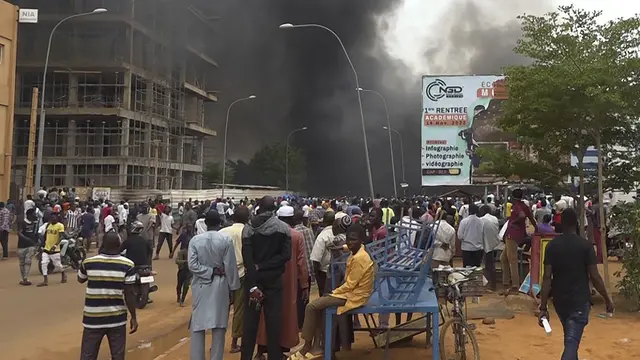Days after soldiers ousted Niger's president, uncertainty is mounting about the country's future and some are calling out the junta's reasons for seizing control.
The soldiers said they overthrew President Mohamed Bazoum, who was elected two years ago, because he wasn't able to secure the nation from growing jihadi violence. But some analysts and Nigeriens said that's just a pretext for a takeover that is more about internal power struggles than securing the nation.
"Everybody is wondering why this coup? That's because no one was expecting it. We couldn't expect a coup in Niger because there's no social, political or security situation that would justify that the military take the power," said Professor Amad Hassane Boubacar, who teaches at the University of Niamey.
Bazoum wanted to replace the head of the presidential guard, General Abdourahmane Tchiani, who also goes by Omar and is now in charge of the country, said Boubacar, adding that Tchiani was loyal to Bazoum's predecessor and that sparked the problems.
Conflict experts say out of all the countries in the region, Niger has the most at stake if it turns away from the West, given the millions of dollars of military assistance the international community has poured in.
On Saturday, U.S. Secretary of State Antony Blinken said the continued security and economic arrangements that Niger has with the U.S. hinged on the release of Bazoum — who remains under house arrest — and the restoration of constitutional authority in the country.
France on Saturday suspended all development aid and other financial aid for Niger, the Foreign Ministry said in a statement. "France demands an immediate return to constitutional order under President Mohamed Bazoum, who was elected by the Nigeriens," it said.
The African Union has issued a 15-day ultimatum to the junta in Niger to reinstall the country's government. On Sunday, the West African regional bloc, known as ECOWAS, is holding an emergency summit in Abuja, Nigeria.
However, in a televised address Saturday, Brigadier General Mohamed Toumba, one of the soldiers who ousted Bazoum, accused the meeting of making a "plan of aggression" against Niger and said it would defend itself.
And protesters taking part in Sunday's rally also warned regional bodies who have denounced the coup to stay away. "I would like also to say to the European Union, African Union and ECOWAS, please please stay out of our business," said Oumar Barou Moussa who was at the demonstration.
"It's time for us to take our lives, to work for ourselves. It's time for us to talk about our freedom and liberty. We need to stay together, we need to work together, we need to have our true independence," he said.
Niger experts say it's too soon to know how things will play out.
"Tensions with the military are still ongoing. There could be another coup after this one, or a stronger intervention from ECOWAS, potentially military force, even if it is difficult to foresee how specifically that may happen and what form that may take," said Tatiana Smirnova, a researcher at the Center FrancoPaix in conflict resolution and peace missions.
"Many actors are also trying to negotiate, but the outcome is unclear," she said.
(AP)
 简体中文
简体中文

